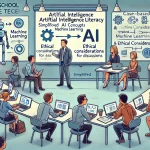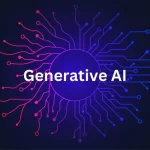
Quantum Computing and AI
December 29, 2023I. Introduction:
In the vast realm of technological advancement, a new era is dawning—one that holds the promise of reshaping the very foundations of artificial intelligence and scientific exploration. Imagine a world where the inconceivable becomes routine, where complex problems are untangled effortlessly, and the boundaries of computation are pushed beyond our wildest dreams. This is the transformative potential that quantum computing brings to the forefront of innovation.
Classical computers, the workhorses of our digital age, have served us well in processing information and solving intricate problems. Yet, as the frontiers of knowledge expand and the hunger for more data grows insatiable, classical computers find themselves grappling with the sheer magnitude of complexity. From simulating quantum systems to deciphering intricate patterns in vast datasets, the limitations of classical computing are becoming increasingly apparent.
The crux of the matter lies in the binary nature of classical bits, which can exist in one of two states—0 or 1. While this binary logic has been the backbone of computation for decades, it proves to be a bottleneck when dealing with the intricacies of quantum mechanics or handling massive datasets. Enter quantum computing, a revolutionary paradigm that transcends the binary constraints of classical computation and taps into the mind-bending principles of quantum mechanics.
In the quantum realm, quantum bits, or qubits, can exist in multiple states simultaneously—a phenomenon known as superposition. This inherent ability to exist in multiple states exponentially expands the computational possibilities, enabling quantum computers to process vast amounts of information in parallel. Furthermore, qubits can become entangled, meaning the state of one qubit directly influences the state of another, even if they are physically separated. This interconnectedness opens up avenues for solving problems at speeds and scales that were once thought unattainable.
As we delve into the intricacies of quantum computing, we embark on a journey where the boundaries of classical computation are shattered, giving rise to a new era of exploration and discovery. The fusion of quantum computing with artificial intelligence heralds a future where the once-insurmountable challenges become stepping stones to unprecedented breakthroughs. In the following exploration, we unravel the layers of quantum computing, unveiling its potential to redefine the landscape of AI and scientific inquiry.
II. Quantum Computing for AI Advancement:
Train Your AI on Steroids: How Quantum Computing Supercharges Deep Learning
In the relentless pursuit of artificial intelligence excellence, the marriage of quantum computing and deep learning emerges as a game-changer. Quantum algorithms, specifically tailored for machine learning tasks, hold the key to a quantum leap in the efficiency and speed of training deep neural networks.
- Accelerating Training with Quantum Algorithms: Traditional deep learning models demand extensive computational resources and time for training, often hindering progress. Quantum algorithms, on the other hand, leverage the parallelism afforded by qubits to process and analyze data at unprecedented speeds. For instance, algorithms like quantum gradient descent and quantum singular value transformation streamline the optimization process, drastically reducing the time required for model training.
- Benefits of Faster Training: The accelerated pace of training bestowed by quantum computing translates into tangible benefits for AI applications. Improved accuracy, increased efficiency, and the capacity to develop more intricate neural network architectures are among the immediate advantages. Quantum-enhanced deep learning enables researchers and practitioners to explore complex models that were once computationally prohibitive, leading to heightened precision in AI tasks.
- Applications in Natural Language Processing and Computer Vision: The potential of quantum computing in AI becomes particularly evident in natural language processing (NLP) and computer vision applications. Quantum algorithms can enhance language understanding, enabling AI systems to discern context nuances with greater finesse. In computer vision, the rapid processing capabilities of quantum computing open avenues for real-time analysis of intricate visual data, contributing to advancements in fields such as medical image analysis and autonomous systems.
- Performance Gains: Quantifying the impact of quantum computing on AI necessitates a glance at the performance gains achieved. Comparisons between classical and quantum approaches reveal significant reductions in training times. For instance, a task that might take weeks on a classical computer could be completed in a fraction of the time with quantum acceleration. These gains not only enhance productivity but also pave the way for tackling larger datasets and more complex AI challenges.
As quantum computing continues to evolve, the symbiotic relationship between quantum algorithms and AI promises a future where the boundaries of machine learning are redefined. The capacity to train AI on steroids, propelled by the power of quantum computation, not only expedites progress but also charts a course towards AI models of unprecedented sophistication and capability.
III. Unleashing Scientific Discoveries with Quantum Computers:
Subheading: Quantum Vision: Peering into the Unknown with Big Data Analysis.
In the relentless pursuit of scientific advancement, quantum computers emerge as unparalleled tools, offering a quantum leap in our ability to analyze vast datasets with unprecedented speed and precision. This transformative capability fundamentally alters the landscape of scientific inquiry, opening doors to discoveries previously obscured by the limitations of classical computing.
1. Analyzing Vast Scientific Datasets:
- Quantum Parallelism: Unlike classical computers that process data sequentially, quantum computers exploit the principles of superposition and entanglement to perform parallel computations. This inherent parallelism allows them to handle massive scientific datasets swiftly and efficiently, reducing analysis times from weeks to minutes.
- Quantum Speedup: Quantum computers excel in tasks that involve complex calculations and intricate data structures, enabling scientists to explore datasets of unprecedented size and complexity. This quantum speedup has the potential to revolutionize data-intensive scientific fields.
2. Identifying Hidden Patterns and Correlations:
- Quantum Entanglement: The unique property of entanglement in quantum systems allows qubits to be correlated in ways classical bits cannot. Quantum computers leverage entanglement to uncover hidden patterns and correlations within datasets that classical computers may overlook.
- Machine Learning with Quantum Data: Quantum machine learning algorithms, such as quantum support vector machines and quantum clustering, enable the extraction of nuanced patterns from data. This capability proves invaluable in deciphering complex relationships within scientific datasets.
3. Impact on Scientific Fields: Biology, Physics, Astronomy, and Beyond:
- Biology: Quantum computing can revolutionize genomics and drug discovery by rapidly analyzing vast genomic datasets, predicting protein structures, and simulating biological processes with unprecedented accuracy.
- Physics: Quantum simulations can model quantum systems that are practically impossible for classical computers to emulate accurately. This is particularly significant in areas like material science, quantum chemistry, and condensed matter physics.
- Astronomy: Analyzing astronomical data, from vast sky surveys to simulations of cosmic phenomena, is enhanced by the computational prowess of quantum systems. This can lead to discoveries ranging from the nature of dark matter to the origins of celestial objects.
4. Breakthroughs and Potential Avenues for Exploration:
- Quantum Drug Discovery: Accelerating the discovery of new pharmaceuticals by simulating molecular interactions with unprecedented detail, expediting the identification of potential drugs.
- Quantum Climate Modeling: Improving climate models by simulating complex interactions within Earth’s climate system, aiding in the understanding of climate change and its potential impacts.
- Quantum Cryptography: Strengthening the security of communications and data transmission through the development of quantum-resistant cryptographic protocols.
In essence, quantum data analysis serves as a beacon, illuminating the uncharted territories of scientific exploration. As quantum computers continue to evolve, their capacity to reveal hidden insights within vast datasets promises a future where groundbreaking discoveries become not just possible but routine in the realms of biology, physics, astronomy, and beyond.
IV. The Road Ahead: Challenges and Opportunities:
As we navigate the uncharted waters of quantum computing, it’s crucial to recognize the hurdles that currently mark the road ahead. The immense potential of this transformative technology is accompanied by formidable challenges, yet the journey is far from insurmountable.
1. Current Limitations and Challenges:
- Quantum Decoherence: The delicate nature of qubits makes them susceptible to decoherence, where external factors disrupt their quantum states. Maintaining coherence over extended periods remains a significant challenge.
- Error Correction: Quantum systems are susceptible to errors due to environmental factors and inherent hardware imperfections. Developing robust error correction mechanisms is vital for the reliability of quantum computations.
- Hardware Scalability: Building large-scale, fault-tolerant quantum computers poses engineering challenges. Achieving hardware scalability while maintaining low error rates remains a persistent obstacle.
2. Ongoing Research and Development Efforts:
- Quantum Error Correction: Researchers are actively exploring error correction techniques, including surface code and topological qubits, to mitigate the impact of errors on quantum computations.
- Materials Science: Advances in materials science aim to identify and develop materials that exhibit the necessary quantum properties with greater stability, addressing the issue of quantum decoherence.
- Algorithmic Improvements: Ongoing research focuses on refining quantum algorithms to enhance their efficiency, reduce resource requirements, and expand their applicability to a broader range of problems.
3. Immense Potential for AI and Scientific Advancement:
- Long-Term AI Impact: Looking beyond the challenges, the long-term potential of quantum computing for AI is staggering. Quantum machine learning algorithms hold the promise of outperforming classical counterparts in complex problem-solving, revolutionizing AI capabilities.
- Scientific Exploration: In the scientific realm, quantum computers offer the potential to simulate quantum systems with unprecedented accuracy, unlocking mysteries in fields such as quantum chemistry, materials science, and fundamental physics.
4. Call to Action: Unlocking the Full Potential:
- Investment in Research and Development: To surmount the current challenges and fully unleash the transformative potential of quantum computing, there is an urgent need for sustained investment in research and development. Governments, industries, and academia must collaborate to accelerate progress.
- Collaborative Initiatives: Establishing collaborative initiatives that bring together experts from diverse fields, including quantum physics, computer science, and materials science, can foster innovation and accelerate breakthroughs.
- Educational Initiatives: Investing in educational programs to train the next generation of quantum scientists and engineers is vital. Building a skilled workforce will play a crucial role in overcoming the challenges and maximizing the benefits of quantum computing.
In conclusion, the road ahead for quantum computing is one of both challenges and opportunities. Acknowledging the hurdles while actively investing in research and development is key to realizing the transformative potential of quantum computing for AI and scientific advancement. It is a journey that demands collective effort, dedication, and a shared commitment to unlocking the boundless possibilities that lie beyond the quantum horizon.

















